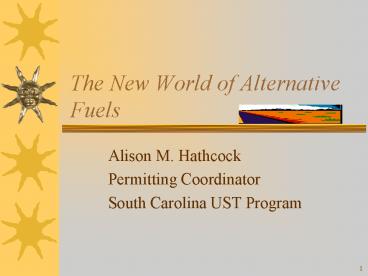The New World of Alternative Fuels - PowerPoint PPT Presentation
1 / 24
Title:
The New World of Alternative Fuels
Description:
Reduced Fuel Economy. 4. Compatibility Concerns. Why should we ... Conductivity and Fuel Economy. Ethanol has a greater electrical conductivity than petroleum ... – PowerPoint PPT presentation
Number of Views:58
Avg rating:3.0/5.0
Title: The New World of Alternative Fuels
1
The New World of Alternative Fuels
- Alison M. Hathcock
- Permitting Coordinator
- South Carolina UST Program
2
Alternative Fuel Overview
- Two main categories
- Ethanol
- Most common E10 and E85
- Concerns lie with ethanol blends greater than E10
- Biodiesel
- Most common B20
- Concerns lie with biodiesel blends greater than
B20
3
Advantages and Disadvantages of Ethanol Blends
- Improves air emissions
- Can improve octane
- Tax Incentives
- Less Dependence on foreign fuels
- Compatibility Concerns
- Phase Separation
- Accelerated Corrosion
- Conductivity
- Reduced Fuel Economy
4
Compatibility Concerns
- Why should we worry about compatibility?
- State and Federal rules require that all
equipment used for storing and dispensing motor
fuels be compatible with the product being stored
5
Compatibility Concerns
- Cant you use the same equipment that you use for
regular unleaded gasoline? - The answer to this is no. Ethanol blended fuel
can cause system parts to degrade and dissolve
over time.
6
Equipment Concerns
- Why is equipment affected?
- Simply put, E85 is not compatible with soft
metals such as aluminum, brass and zinc many
plastics, such as polyurethane and PVC and
certain resins used in older, lined tanks.
7
How can these concerns be addressed?
- UL-listed for high blend fuels
- Manufacturer can provide documentation
- Many components made are compatible
- Information is not readily available
- Nickel plating
8
Phase Separation and Accelerated Corrosion
- What is Phase Separation?
- Ethanol separates from the petroleum when water
enters the tank. - Why does Accelerated Corrosion occur?
- Loosens internal deposits and sludge
- Degrades corrosion plugs
- To avoid it-clean the tank properly
9
Conductivity and Fuel Economy
- Ethanol has a greater electrical conductivity
than petroleum - Fuel Economy
- Decreases by about 10
10
What is Biodiesel?
- Produced from vegetable oils or recycled greases
- Raw oils that have not been processed should be
avoided - Recognized as an alternative fuel under 1992
Energy Policy Act
11
B20
- Most common blend
- Good balance between cost, emissions,
performance, compatibility and solvency - Minimum blend for compliance with Energy Act
- 1 to 2 percent decrease
- in Fuel economy
12
Advantages and Disadvantages of Biodiesel
- Tax Incentives
- Less foreign fuels
- Increased lubrication
- Reduced air emissions
- Renewable
- Nontoxic
- Biodegradable
- Compatibility concerns (gtB20)
- Cold flow
- Fuel Economy
- Solvency
13
Compatibility Concerns
- Potential equipment problems
- Only evident for blends greater than B20
- Hoses and Gaskets
- Inappropriate filters may clog
- Some plastics
14
Compatibility Concerns
- Brass, Bronze, Copper, Lead may accelerate
corrosion and create sediments - Fittings made of these materials may change
colors - Natural Rubber and Nitrile may soften and cause
gaskets to fail
15
Acceptable Materials
- Teflon, Viton, Fluorinated Plastics, Nylon
- Aluminum, Steel, Fluorinated Polyethylene and
Polypropylene, Fiberglass - Questions on materials National Biodiesel Board
16
Recommendations
- Nozzle Conversion kit for compatibility issues
- 30 Micron filter for solvency issues
- Set up monthly monitoring program
17
Other Biodiesel Concerns
- Cold Flow
- Freezes/ gels at higher temperatures then
conventional diesel - May cause filters to clog
- Fuel Economy
- Economy decreases with higher blends
- Solvency
- May loosen/dissolve sediments in tank
18
What should aninspection consist of?
- Signs of wear on hoses, gaskets and seals
- Regular filter changes
- Automatic tank gauge is calibrated for biodiesel
and is producing accurate results - Check for proper labeling
19
SC UST Program Alternative Fuel Initiatives
- Created Alternative
- Fuel Checklist
- Should be completed
- for new installs and
- conversions
- Required for blends
- greater than B20/ E10
- Recommended for all
- other blends
20
SC UST Program Alternative Fuel Initiatives
- Established relationship with Palmetto Clean
Fuels Coalition - Created an alternative fuel reference guide
- contains compatibility documents and research
21
SC UST Program Alternative Fuel Initiatives
- Contacted owners who converted prior to checklist
- Shared our knowledge with EPA Regions 3, 4 and 5
- Established a program to track all facilities who
use alternative fuels (USTs only) - Current SC E85 UST locations 45
- Current SC B20 UST locations 39
22
Current/Proposed Alternative Fuel Production Sites
23
SC E85/Biodiesel Consumption (Gallons)
24
Questions?
- Thank you for your time!
- Alison M. Hathcock
- UST Permitting Coordinator
- SC Dept. of Health Environmental Control
- (803) 896-6942
- hathcoam_at_dhec.sc.gov































